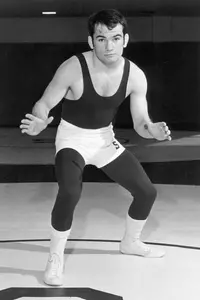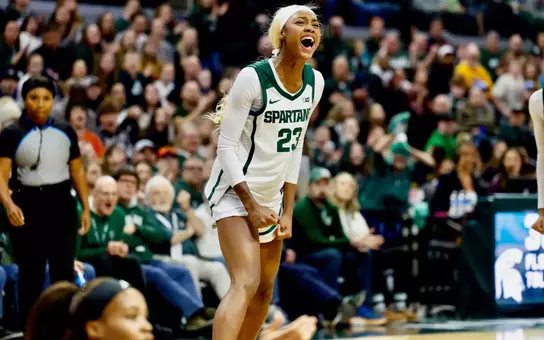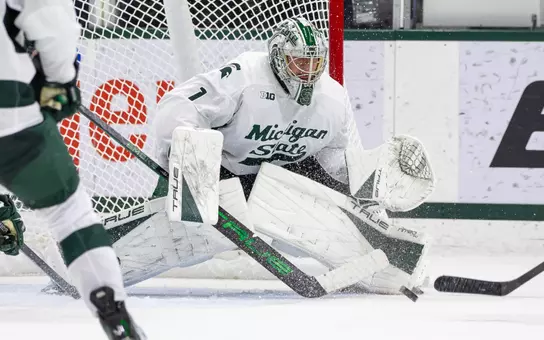Michigan State University Athletics

2014 MSU Athletics Hall of Fame Class: Greg Johnson
9/17/2014 12:00:00 AM | General
By Steve Grinczel, MSUSpartans.com Online Columnist | @GrinzOnGreen
Whether he was trekking through the Himalayas or wrestling for Michigan State, Greg Johnson stood up to every challenge.
And before succumbing to a rare blood disorder in 2001 at the age of 52, there was a reason Johnson was fiercely driven in all that he did, according to his older brother Jeff.
"He was a little bit small in stature growing up," Jeff said. "And to be honest with you, I think that was one of the motivating factors. When you're a little bit small in stature, you tend to try a little bit harder and stand a little bit taller. And when he put his mind to something, boy he went for it.
"He was kind of a varied man; very, very focused. His accolades were many during the short period of time that he was with us and I am extremely proud of him, considering his sport being one of the highest-disciplined of all. I wasn't an athlete myself, but I viewed it from the inside and saw what it took to accomplish what he did - I'm still reeling from that."
Johnson's will to succeed, perhaps even more than his sublime ability, is what moved him to become the first Big Ten wrestler to win three national championships and ultimately end up in the MSU Athletics Hall of Fame.
"He'd be so proud," Jeff said. "He loved Michigan State. Although he worked as a coach all around the world, he loved the green and white. I'm thankful I had the opportunity to spend a lot of time with him traveling, and living with him and enjoying his spirit."
Johnson's steely determination began the tempering process while growing up in a single-parent household with his mother, Zoe, brother and sister in Lansing, not far from the MSU campus.
"Greg had expressed some interest in attending a wrestling camp, but my mother at that time couldn't afford that with three kids," said Jeff. "A good friend of our family and supporter of Greg through the years, by the name of Gary Schassberger, said, `I'll pay for it,' and that started his career."
Johnson received priceless moral support from his mother as he worked his way through the wrestling ranks at Lansing Everett High School, where he won back-to-back state titles.
"There was a lot of encouragement and reinforcement by my mother," Jeff said. "My mother, bless her heart, went to every wrestling meet."
|
"Physically, he was probably the toughest wrestler I ever had. You couldn't wear him out. He'd just go and go and go, and anybody who was near his weight class, why he'd just go with them until they got tired. He was almost unbelievable."
-Former MSU wrestling coach Grady Peninger
|
Johnson's Spartan career, under legendary coach Grady Peninger, got off to an inauspicious start. He sat out the 1967-68 season as a true freshman and a broken ankle cost him the '68-69 campaign as well. Greg sustained a fractured leg the following summer and missed the first six weeks of the '69-70 season.
He finally made his Michigan State debut in the 118-pound class in January 1970 with a victory. He lost his second match to Ray Stapp of Oklahoma State, but would go through the rest of the season undefeated while leading MSU to its fifth of an unprecedented seven consecutive Big Ten titles. Johnson also exacted revenge on Stapp by beating him in his final match of the season for his first NCAA championship.
Johnson made Stapp pay again with a 5-2 victory in the East-West All-Star Meet in Stillwater, Oklahoma, during the '70-71 season. Johnson completed the season with a 19-2-2 record after beating Navy's Ron Schuler for the national crown.
After the NCAA granted Johnson an extra year of eligibility based on his absence for medical reasons in '68-69, he was named captain of the Spartans, and he led in grand style.
"It was just in his makeup and the whole team, again going back to that stature thing, looked up to him," said Jeff, who didn't get to witness his brother's exploits at Michigan State first-hand because he was serving in Vietnam. But, he learned of them through frequent letters.
Johnson catalyzed MSU's seventh straight Big Ten crown with his third conference title, which earned him Most Outstanding Wrestler honors at the league meet. He paced the Spartans to a second-place finish in the NCAA meet by tagging Oklahoma's Gary Breece with a 9-5 victory for his final individual national championship.
Johnson is one of just 28 wrestlers to win three NCAA titles. He finished his Michigan State career with a 54-5-2 record and 17 falls, and his .902 winning percentage ranks 10th on the school's all-time list. For his efforts, the Amateur Wrestling News named Johnson its 118-pound "Wrestler of the Decade."
Peninger called Johnson a once-in-a-coaching-career-type of athlete, much like Magic Johnson was for retired head Spartan basketball coach Jud Heathcote.
"Physically, he was probably the toughest wrestler I ever had," Peninger said. "You couldn't wear him out. He'd just go and go and go, and anybody who was near his weight class, why he'd just go with them until they got tired. He was almost unbelievable. You're just fortunate as a coach to have someone like him come around because all you had to do is get out of the way and let Greg work, and work and work. "God bless him, he was his own man. He was relentlessly talented."
After graduating from MSU, Johnson worked as an assistant coach at Clarion State College (now Clarion University) in Pennsylvania and then at Utah before serving as the head coach of the University of Illinois wrestling program from 1978-83.
He headed up Australia's New South Wales Wrestling Federation in the mid-`80s "for three years," Jeff said. "But when it came time to renew his visa, the country decided they should probably go in-house instead of having someone from the United States to be their representative."
Johnson's association with wrestling came to an end with a stint as the Alfred State (N.Y.) Junior College head coach, but throughout his adult life, Jeff described his brother as "a Renaissance man" who traveled the world.
"His spare time was spent climbing mountains, from Mount McKinley, to spending summers in Yosemite climbing the Highlands," Jeff said. "He didn't get to Everest but he was in the Himalayas. This wasn't just rock climbing, this was the real technical kind. He was a backwoods person and loved camping. He had all kinds of motorcyles and was always going full-tilt.
"He was a bona fide gusto guy. There's not a whole lot of those kind of people around anymore."




